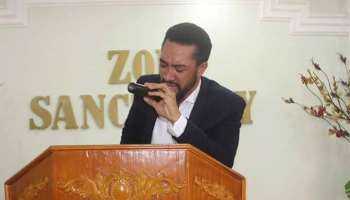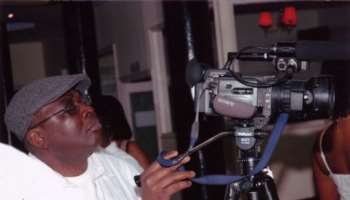Why I did a movie about ‘Yahoo! Yahoo!’ –Diete-Spiff
Sebari Diete-Spiff is the managing director of Impression Films. She is also the producer and director of the yet to be released movie 12:30.
In this interview with Reporter, Ovwe Medeme, she recounted how she stumbled into the world of movie making, her reception coming back to Nigeria, as well as the need to address cyber crime in the country.
What is the movie 12:30 all about?
It is a film set in Nigeria about two brothers who have similar ambitions to make money and bring their family out of poverty but they both take different routes in getting to meet the ambition. One of them decides to go into cyber crime while the other decides to enter for a street dance competition. They both have to deal with the consequences of their actions.
Why did you pick cyber crime as a theme to address?
I have been working on a project called The Incorruptible. Sometime in August last year, we had the opportunity to bring together some young people in Abuja to do a writing workshop sponsored by the National Film and Videos Censors Board (NFVCB) as part of their media literacy programme. We asked them that between peace, good governance and anti-corruption, what issues were of concern to them and they all came back with anticorruption and in particular, they mentioned cyber crime. They felt that the 'Yahoo! Yahoo!' syndrome is something that has marred the image of Nigerians, especially young Nigerians living or studying abroad. Some of them said to me that it wasn't their inheritance and so they shouldn't be labelled as 'Yahoo!' criminals when most of them are not doing it.
Is 12:30 your first attempt as a moviemaker?
It is my second feature film here in Nigeria. The first one I did was in 1995 and it was called Osaro, but as far as I know, that film has not been released. It was more of a low budget Nollywood film; 12:30 is not my first film.
What challenges did you face putting the movie together?
The biggest challenge I have had for the movie is financial. That is always the challenge for any moviemaker anywhere in the world. We always try to raise money even if the subject matter being addressed is crucial and topical. It has been very difficult trying to convince people to put their money down. No one thinks that young people have a voice when it comes to anti-corruption and stopping it altogether.
When is the expected release date for the movie?
12:30 should be released in Nigeria later this year or early 2011.
How effective would you say the movie is in carrying out the anti-corruption crusade?
Movie is the most powerful medium we have at the moment. The screen is such a powerful medium because not only do you hear; you also see how you can change your behaviour. What we are trying to do here is to make use of behaviour change communication methods by creating characters that young people can identify with. We try to bring out the good; the bad as well as the ugly so that young people especially can identify with the characters, follow their journeys, follow their choices and hopefully learn from the good example that they see on screen.
What did it take you to establish your production outfit?
It wasn't really finance that helped our production outfit to get to where it is. It has been the positive attitude that we adopt over the years. We have the belief that we can do it, we can make it and there is no reason to say no we cannot. I have been very lucky to work with a lot of young talented people who have the energy and have refused to succumb to the doors that have been closed to our faces.
What do you see as the ultimate solution to cyber crime?
I think education will go a long way to put an end to cyber crime. We spend a lot of time and money talking about young people getting involved in ICT but the question is what happens after the training? There are no jobs so we still have the same poverty problem. If a young person realises that it does not pay to be a criminal, it does not pay to dupe other people, then their conscience will be the thing that stops them from going ahead. Poverty is all around and it is the only factor that would make a person do what is not normally human.
Where did you get your training as a filmmaker?
I have been making films since the age of 18. I was in the industry first in the UK before I came back to Nigeria. I had all kinds of opportunities. I even worked a little bit as a photographer. You could say I have always been involved in telling stories making use of the lens over the years and doing movies is a continuation of that.
As a filmmaker from the United Kingdom, what are you bringing home to the Nigerian industry?
For me, experience-wise, there are many good filmmakers in Nigeria. I am not bringing anything that is necessarily unique apart from the disposition that anything is possible when you believe in yourself and people believe that you can do it.
What would you say about the quality of movies we make in Nigeria and what would be your message to Nigerian filmmakers?
The quality of movies we make in Nigeria are certainly getting better. Everyday, I see improvements and effort by different filmmakers in making sure that their work is not just seen in Nigeria but is seen globally. Nollywood movies are definitely getting better.
Is there a particular reason you chose this line of career?
When I was very young, I realised the power of the lens in exciting people, in educating people, in getting people to reflect on their lives. I was 18 when I made my first short movie. I stumbled into the career. It wasn't planned. I was meant to be a diplomat or to do something formal but I stumbled into it and the first time I saw an audience watch a film that I made, I realised that this is what I was made for.
How did your parents react to your change in career choice?
My folks, like with most folks at that time, did not understand the viability of such a career but my mother began changing her mind when I invited her to see a film of mine that was being shown at the Kodak Theatre in London, she was very proud and after that, she always supported me.
Can you recount your first experience as a filmmaker?
My first experience as a filmmaker was the film I made as a teenager. It was a minute and a half long. It was a wonderful experience because I remember when the lights went down, and people watched my film, there was silence and for the first time, I remember that the people were focused on what I had created. Then I realised the power of the hand and the head in creating something that will change perception of certain issues.
Looking back at your first movie, do you feel like changing any part of it?
There is nothing I have done in it that I would like to change because everything I have done has been a part of the progression in my life.
Coming back to Nigeria, what was the reception like?
It was fine. When I first came back to Nigeria, it was to work with the BBC World Service Trust so I had a cushioned landing. Being a business person and the chief executive of a company is a different kind of experience because I found myself joggling a lot of things at the same time and trying to make each of them work. It has been good so far.
Latest News
-
 I Don't Like Being Sprayed With Money —- Seun Kuti
I Don't Like Being Sprayed With Money —- Seun Kuti -
 “I Wouldn't Advise Myself To Be With Someone In My
“I Wouldn't Advise Myself To Be With Someone In My -
 Nollywood Actress, Etinosa Idemudia Stands With Ph
Nollywood Actress, Etinosa Idemudia Stands With Ph -
 Bobrisky Heads To Appeal Court, Challenges Six-mon
Bobrisky Heads To Appeal Court, Challenges Six-mon -
 “Sometimes, The Answers To Your Problems Lies In Y
“Sometimes, The Answers To Your Problems Lies In Y -
 “Man Of The Year" - Pretty Mike Crowns Portable
“Man Of The Year" - Pretty Mike Crowns Portable -
 Yingi Debuts "Waterside Girl EP"; A Melodic Journe
Yingi Debuts "Waterside Girl EP"; A Melodic Journe -
 Singer, Joeboy Reveals Criteria For Men To Know Tr
Singer, Joeboy Reveals Criteria For Men To Know Tr -
 “I Wish I Had Found Love Before Now– Spyro
“I Wish I Had Found Love Before Now– Spyro -
 Toyin Abraham Appreciates Funke Akindele, Barring
Toyin Abraham Appreciates Funke Akindele, Barring














